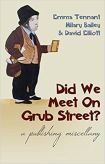Did We Meet on Grub Street? by Emma Tennant, Hilary Bailey and David Elliott
Essentially, the three authors (all of whom have long careers in the book industry) revel in the idea of being whining old curmudgeons who miss the good old days of publishing. This unashamed nostalgia provides the focus of the book and allows the writers to recount numerous anecdotes from their days in the publishing business. Whilst the primary audience for this book may well be students of creative writing and media studies, it also serves as an interesting exploration of an aspect of modern history: how a once-burgeoning industry is now a shell of its former self, much like a lot of manufacturing. Because of this, I was disappointed that no space was given to a consideration of how the rise of the e-book and Kindle has directly damaged both the sale of books and the potential for new books to be written (fewer real books sold = fewer financial advances paid to writers = fewer books written). Also, given the clear love of books as treasured artifacts, the dismissal of the Harry Potter phenomenon seems truculent, given the impetus the series gave to reading amongst both the young and adults.
| Did We Meet on Grub Street? by Emma Tennant, Hilary Bailey and David Elliott | |
|
| |
| Category: Entertainment | |
| Reviewer: Ed Robson | |
| Summary: Did We Meet On Grub Street? is a collection of written pieces about the book industry, featuring contributions from writers, publishers and editors, bringing alive the process of how writing ends up on the printed page. In looking at the book trade, it is both a reminiscence and a critique of publishing. | |
| Buy? Yes | Borrow? Yes |
| Pages: 179 | Date: December 2014 |
| Publisher: Quartet | |
| ISBN: 978-0704372986 | |
|
| |
However, there is much here to enjoy. It is, as the subtitle says, a miscellany – a book offering a variety of different pieces of writing (as with paper books, a vanishing phenomenon). I particularly enjoyed the section describing the development of feminist literature through the rise of publishers such as The Women’s Press. There is also an insightful critique of women’s writing, penned in the late seventies. In addition, there is advice on how to structure a book in order to increase your chances of it being published; and Emma Tennant includes a section about how she failed to get a book written for an American publisher, which reads like fiction (perhaps it is, although the structure of the book makes this unclear).
The book is full of critiques of writing and publishing, of diarised reminiscences of writers and characters that populated the book world in Britain during its boom years. Some of the stories about writers such as John Osbourne and John Mortimer undeniably amount to little more than gossip, but this adds to the picture of the book industry seeing itself much like the theatre (or any other branch of the arts), where certain people were considered not part of the gang. Unlike many other types of celebrity gossip though, this comes across as neither fawning or mean-spirited, but genuinely affectionate.
One weakness of the book (ironically, for a tome about publishing) is a lack of organisation of its contents. There is no chapter list, no index and very few chapter headings within the narrative. This means that it can sometimes be hard to follow, or even know who the author of a particular section is. The writing itself is largely of a high standard - the only time the book becomes really self-indulgent is in the section written by Naim Atallah, who clearly has an overdeveloped sense of his own importance and recounts at tedious length the parties he attended through his involvement in publishing, meeting people he clearly feels are important but of whom the average reader will probably say – ‘’Who’’? (Does anyone know who the Marquess of Worcester is, for example)?
Did We Meet on Grub Street? is unashamedly a love letter to the publishing and reading of books. As an inveterate reader who has vowed never to use a Kindle, let alone buy one, it struck several chords with me – not least, the emotional attachment many people still have to the printed word.
If this book appealed to you we can also recommend Merchants of Culture: The Publishing Business in the Twenty-First Century by John B Thompson .
Please share on: ![]() Facebook,
Facebook, ![]() Twitter and
Twitter and
![]() Instagram
Instagram
![]() You can read more book reviews or buy Did We Meet on Grub Street? by Emma Tennant, Hilary Bailey and David Elliott at Amazon.co.uk Amazon currently charges £2.99 for standard delivery for orders under £20, over which delivery is free.
You can read more book reviews or buy Did We Meet on Grub Street? by Emma Tennant, Hilary Bailey and David Elliott at Amazon.co.uk Amazon currently charges £2.99 for standard delivery for orders under £20, over which delivery is free.
![]() You can read more book reviews or buy Did We Meet on Grub Street? by Emma Tennant, Hilary Bailey and David Elliott at Amazon.com.
You can read more book reviews or buy Did We Meet on Grub Street? by Emma Tennant, Hilary Bailey and David Elliott at Amazon.com.
Comments
Like to comment on this review?
Just send us an email and we'll put the best up on the site.

